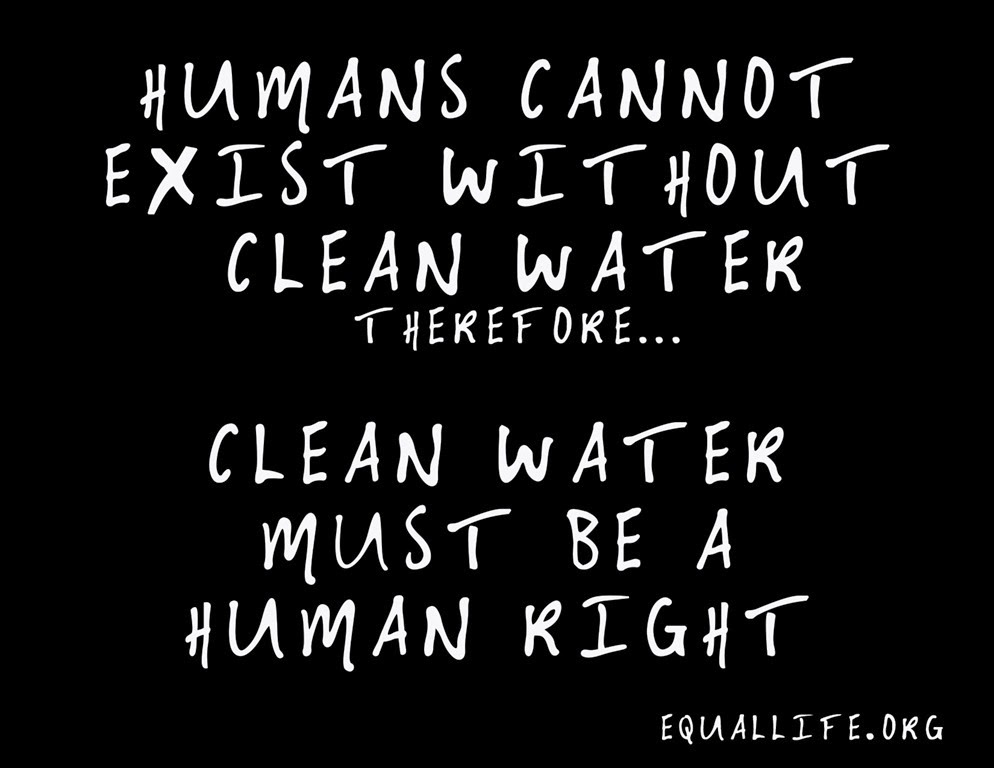Dear Inalienable Rights,
I've been noticing a lot of new rights popping up recently. Access to clean drinking water is a human right. Internet access is a right in France. Animals have rights. Jason Mraz thinks it's our God forsaken right to be loved, loved, loved, loved, loved.
And in a narrow, legal context, rights are good and necessary. Property rights. The right to vote. The right to espouse unpopular opinions. Great stuff. We the People thought about it, we did some trial and error, and we decided to grant everyone within our legal jurisdiction certain privileges and freedoms.
Ending racial segregation and permitting gay marriage are two good examples of rights done right.
But then there's another kind of "rights." These are what you would call inalienable, God-given, moral, or natural rights. And I've been seeing a lot of these recently as well, the only problem being that they don't exist.
We talk about rights with verbs like "recognize" or "confirm" as if they generate themselves or are discovered like the law of gravity. You can make claims on your fellow citizens if they agree to it, but you can't make a claim on nature. Nature does whatever the fuck she wants, and sometimes that means killing you, your rights be damned. When it comes to natural rights, you have a right to fall towards the nearest, largest center of gravity, you have the right to utilize the strong and weak atomic forces, you have the right to die, you have the right to attempt to survive for as long as possible before you do so... and that's all I can think of right now.
As Dr., Prof. and TED talker Yuval Harari once said, "Human rights are also just a fictional story that we have invented, just like the stories about God and heaven. They are not an objective, biological reality. If you take a human being and look inside, you find all kinds of organs and genes and hormones, but you don't find any rights. It's not a biological reality that humans have rights; it's only in the stories that we've invented that humans have rights."
The UN is quite found of dolling out rights that it doesn't have the ability to implement or the authority to enforce. It's a feel-good circle jerk all around, but the end result is typically nothing, because it's the people around you in your community who grant or deny you rights, not nature, not God, and not a nebulous world-wide organization with virtually no legal authority. And that's why the UN so often speaks in terms of "natural" rights, because they aren't usually able to grant the real kind. "Rights" as the UN often uses the word comes closer to meaning a wish list for humanity.
It quickly becomes apparent that what people like to frame as inalienable, God-given, eternally relevant, inherent, intrinsic human rights actually boil to reveal only a complex web of legal claims that people make on each other. It's a flawed, artificial human construct if there ever was one, but people like to dress it up in the disguise of inevitability. The authority is borrowed, however, and the mandate is manufactured. Rights only make sense as conditional legal obligations, not sweeping, absolutist, moral ultimatums.
It's like when people refer to some social behavior they don't like as being "unacceptable."
"Not recycling is just unacceptable."
"I don't like the way you're talking to me. It's unacceptable."
"We need to make dirty jokes in the workplace unacceptable."
"Breastfeeding in public is unacceptable."
What they mean to say is that they don't like X or Y. They'd like the authority to accept or decline said action, and they're borrowing the vocabulary of someone who has the power to accept or decline the action, but they don't actually possess the authority which "I accept" or "we decline" requires to be meaningful. When the judge of your court case says your behavior was unacceptable, men with guns put you in jail. When your spouse tells you your behavior was unacceptable, a divorce may be coming your way. When some self-righteous prick tells you your behavior is unacceptable, give them the bird and keep walking.
.jpg) |
| It's all idealism and no realism. People's eyes just seem to glaze over when they start talking about this stuff. |
I hope I'm not making this sound like a new problem, because it isn't. Natural rights can be found in the work of Plato and Thomas Aquinas. They feature prominently in our own U.S. Constitution. Take this little line for example- "We hold these truths to be self-evident, that all men are created equal, that they are endowed by their Creator with certain unalienable Rights, that among these are Life, Liberty and the pursuit of Happiness."
Any stroll down the hall of a children's hospital will show you that the good Lord obviously does not see fit to endow every human with the right to life or to the pursuit of happiness.
And "inalienable" really can't be the right term either, because all of these rights are conditional. They are predicated upon you playing by the rules and there are exceptions if your pleasure comes into conflict with the pleasure of your neighbors. You're not allowed to pursue happiness if what makes you happy is illegal. Your liberty can be forfeited if you break the law. You don't have a right to life if you are condemned to die by a jury of your peers. You don't have a right to life, liberty or happiness if you are drafted into the military. Taxes. Eminent domain, the list goes on. Turns out these inalienable rights are quite alienable. All these rights are arbitrary and conditional, and they are violated routinely, and they have to be, because many of them are mutually exclusive when applied to more than one person at a time.
"Rights" frames the issue as absolute, incontestable, and uncompromising, but the reality is never black and white. Speaking of human problems in terms of absolute rights makes us feel good because it strips away moral relativism and lets us pretend the real world doesn't demand messy, unsettling compromises.
Take the right to life for example- the idea that there is no price on human life. Everyone gets as much of it as can possibly be provided no matter what. But there is a price on human life, and there are limits; we're just uncomfortable with that fact. Governments and insurance companies put prices on human life all the time. How could there not be? In a world of limited resources, 7 billion rights to maximum lifespan quickly become mutually exclusive. Let's say we had the ability to add a single year to someone's life, maybe by giving them a new, expensive cancer treatment. Should we spend a million dollars to do it? Should we still do it if it costs ten million dollars? What about a hundred million dollars? What if the treatment cost a billion and the patient only got an extra month of life? Would you spend all of the world's resources for a single minute of life extension for one human? Even though nothing would be left for the other 7 billion people? At some point you run into Sophie's Choice. At some point, you have to draw a line and make the hard decision. At some point, whether we want to or not, through action or inaction, we do put a price on human life.
I'm sure your thinking, "You'll be singing a different tune when it's you who's in front of the death panel, being told your life isn't worth the resources necessary to save it." And you're right, I'll probably be begging, borrowing and stealing like an animal to stay alive every second I can. But that won't mean that I was wrong now, it'll just mean that I'll be selfish and desperate then. Like Odysseus tied to the mast, or Christopher Hitchens talking about a possible deathbed conversion, I'm telling you to listen to me now while I'm lucid and ignore me tomorrow if I'm not.
Sincerely,
Sebastian Braff



Comments
Post a Comment